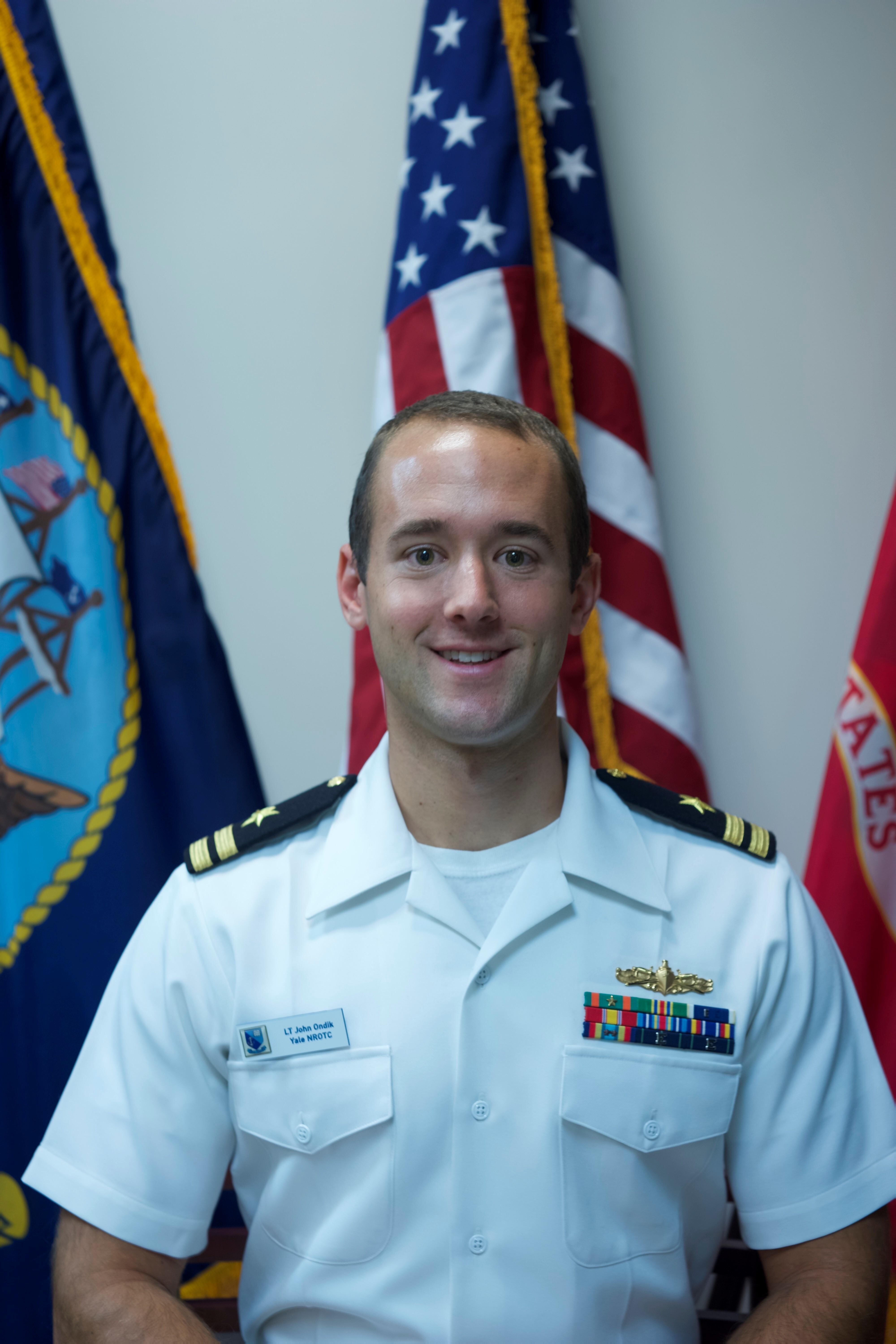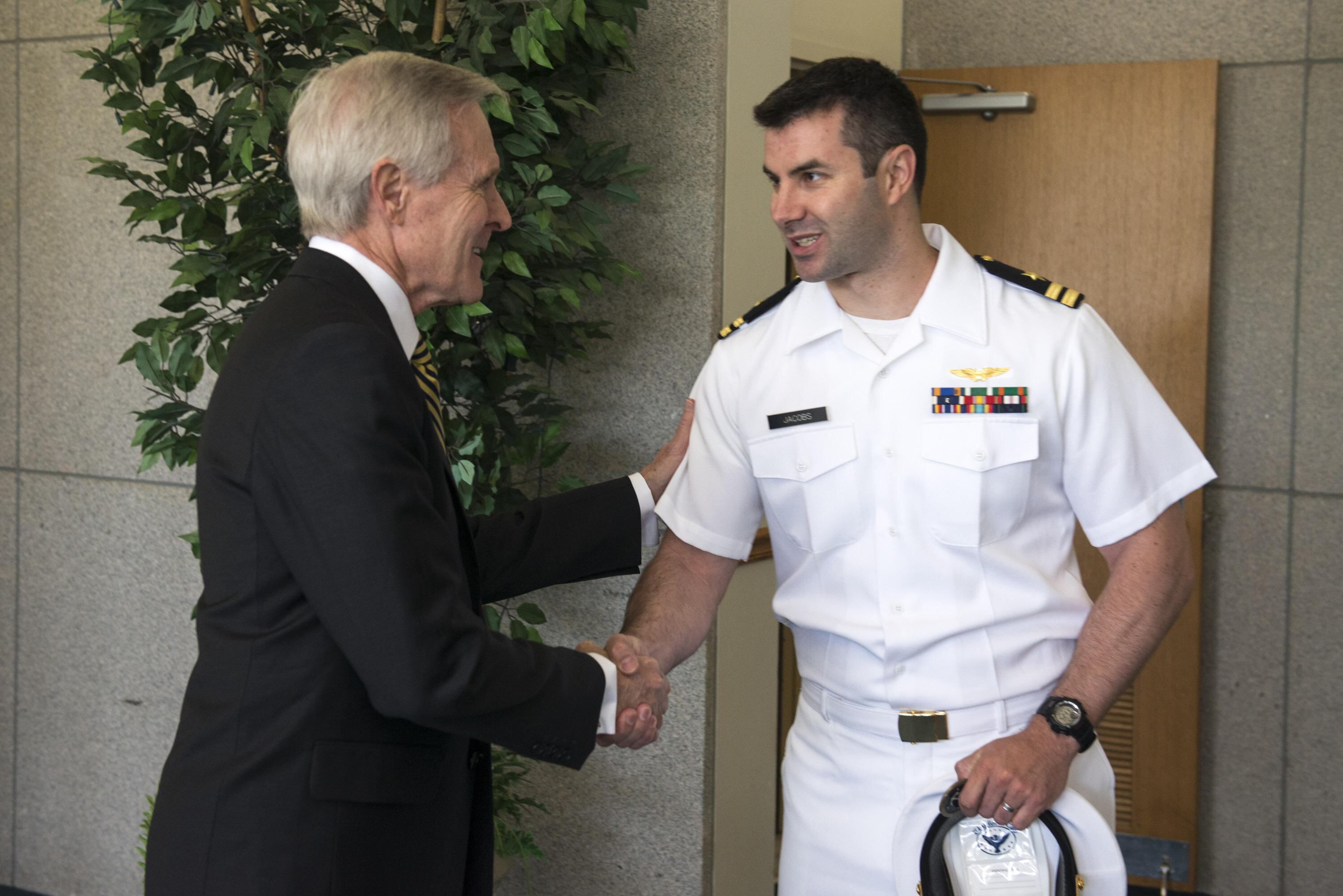Lt. Keith Hollis was getting out of the Navy.
It wasn't that the 2010 Naval Academy grad disliked the Navy — it was just that the service conflicted with his personal goal of getting a graduate degree. After getting accepted to the prestigious Tuck School of Business at Dartmouth College, he examined his options.
"I looked at the options I had at the time with the help of my command," he recalled. "But unfortunately the only thing available to me to pursue this personal goal of mine for the past nine years was to get out of the Navy."
So he submitted his resignation letter, but a chance meeting with his commanding officer, Capt. John F. Meier, changed all that.
"I talked to my captain several times about my situation, most recently in the middle of July," Hollis said. "I told him the only reason I was getting out of the Navy was to pursue this goal, it has nothing to do with my experience."
Meier, the CO of the future carrier Gerald R. Ford, said he was going to find out and get back to him.
Hollis is now one of the first three officers accepted for a plum new program: Going to an elite graduate school on the Navy's dime while still getting their Navy pay. Officials say they plan to select up to 30 officers for this next year, a move intended to keep the best and brightest.
This past May, Navy Secretary Ray Mabus said the service needed to expand offerings of full-time graduate education at top graduate schools, something many corporations already do.
The service has sent officers to school full-time for years at the Naval War College, Naval Postgraduate School and through fellowships at many top schools — but it hasn't been enough and officials say they are bleeding talent to the private sector because of it.
"We need more," Mabus told the graduating class at the Naval Academy in a May 13 address.

Lt. John Ondik who is at Yale.
Photo Credit: Courtesy
This year, the Navy is testing this yet-to-be-named program, sending SWO Lt. John Ondik to Yale and Lt. Joel Jacobs to Harvard.
This program is exclusively for officers and there are no plans to offer graduate or undergraduate education to enlisted sailors under this program, Navy officials say.
For now, officials are calling the program CVINS, which simply means "Civilian Institutions." An instruction is being drafted and is expected on the street sometime soon, personnel officials say.
Next fall, the plan is to send 30 officers to school between their division officer and department head tours.
But unlike other programs, who goes won't be up to a detailer or "big Navy." They'll be chosen from the leadership of the war-fighting communities — including aviation, surface warfare, submarines, naval special warfare, explosive ordnance disposal and information dominance. Many of the details have yet to be worked out, but here's what's been decided so far.
Commands will nominate their best and community leaders will set up a process that selects the overall top performers.
Once offered the program, officers will have to apply to the school of their choice and get accepted. Officials say the Navy is not cutting deals with schools, nor are they streamlining selection for officers behind the scenes.
Once accepted at their school, they'll remain on active-duty with full pay and benefits and will be cut orders to move to the school of their choice.
To take the orders, the officers must agree to a three-year obligation once they complete school, regardless of whether it is a one or two-year course of study.
Meier says that sending junior officers like Hollis to top schools is the right answer.
"If you think about it, the future of our Navy is in the hands of these junior officers who will go on to command ships and squadrons and lead the Navy at the highest levels someday," Meier said.
But in the near-term — especially as the Ford-class carriers come online — preserving the corporate knowledge will benefit the Navy.
"The Ford-class of carrier is a complete revolution in technology and systems — we will really need these sailors and officers to return to this and other ships of this class and re-use the knowledge they are gaining," he said.

Secretary of the Navy Ray Mabus shakes hands with Lt. Joel Jacobs. Jacobs is in grad school at Harvard.
Photo Credit: Courtesy
Lt. Joel Jacobs, a 13-year Navy veteran and naval flight officer, was also ready to leave the Navy to attend Harvard Business School.
"I'd explored all opportunities from the career intermission program to taking my chances on coming back and resigning altogether," he said. His command tried every avenue to keep him in uniform.
Then Jacobs was named Naval Flight Officer of the year by Naval Air Forces.
The fact the Navy's top NFO, a Top Gun graduate, was strongly considering leaving for school made him the de-facto poster child for the new program. When Mabus announced the new program in May, he said Jacobs would be allowed to attend Harvard on active-duty.
Jacobs says his dilemma is one faced by many junior officers.
"Many of us have the dual goals of continuing to serve in the Navy as well as advancing ourselves through graduate education," he said. "And like me, many are willing [to] resign and take their chances on coming back later to meet those goals — being able to do both will definitely keep more of us in the Navy."
Ondik, another SWO, who has served on the cruiser Mobile Bay and the destroyer Wayne E. Meyer, found himself in graduate school by design. He was serving as a Reserve Officer Training Corps instructor at Yale University and was accepted to Yale's School of Management. He says the two years will help him be a better officer.
"This will make me a more effective leader as I go to be a department head, and I'll be the one who the junior officers, the division officers like I was, look to."
"I'll be able to take the street-smart leadership training I got on the job in the Navy and combine it with the book learning that a program like Yale can provide with all the analyzing and critical thinking practical study that goes along with it — and if I can pass that along to my division officers, everybody, including the Navy, wins."
Mark D. Faram is a former reporter for Navy Times. He was a senior writer covering personnel, cultural and historical issues. A nine-year active duty Navy veteran, Faram served from 1978 to 1987 as a Navy Diver and photographer.





